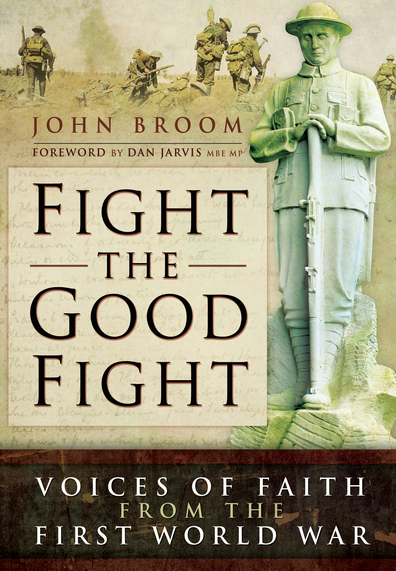Voices of Faith from the First World War
Uplifting and thoughtful glimpse into the lives of ordinary Christians called to extraordinary service
 Fight the Good Fight: Voices of Faith from the First World War
Fight the Good Fight: Voices of Faith from the First World War
by John Broom
Pen & Sword
ISBN 978-1-47385-4154
Reviewed by David Stuckey
When Richard Attenborough’s satirical musical Oh What A Lovely War was recently re-shown on television, I watched it through for the first time in ages. It is easy to get angry in hindsight with the commanders who believed the Great War could be won only if we threw more men at the enemy - “More Men and Yet More Men Until The Enemy Is Crushed” read one familiar recruiting poster at that time.
But then that was the reasoning behind the strategy - and the massive cost in manpower was a price many families had to bear for a generation or more.
This determination to beat the German forces on French soil began with such optimism. The Pals Battalions included workmates and relatives, friends and neighbours – and clerics too – from many of the tight-knit manufacturing communities, especially in the north. They joined up, trained together, went off to war together … and ultimately many of them (too many of them) died together. They fought “For God, King and Country” – it was more than a conflict. It was a crusade.
The spark that ignited John Broom’s determination to delve further into the fervour behind the bare historic statistics, not only of the Great War but also the Second World War, was a cache of letters written by his father during the second conflict. From his research he weaves a compelling tapestry of patriotism, faith and duty.
He delves into the stories behind a number of Christians who ‘fought the good fight’ – some will be well-known, others lesser so – from Edith Cavell and the Chavasse family to John Esselmont Adams who used the Christmas truce to collect and bury may of the dead who lay in No Man’s Land, an action which encouraged the Germans to do the same. Esselmont conducted a joint memorial service for about 100 casualties of the war during the Christmas armistice.
Noel Chavasse was the son of Francis Chavasse, Bishop of Liverpool at the time of the Great War. His twin brother Christopher also served, as a chaplain to the forces during the conflict. Noel served with the Army Medical Corps and is one of only three people to have been awarded the Victoria Cross twice for rescuing wounded soldiers and ferrying them to field stations for their wounds to be treated. He himself died of his wounds in August 1917.
Nurse Edith Cavell’s bravery is renowned – organising an escape route for those she treated instead of abandoning them to German labour camps. Her execution horrified not only those in Britain but wider afield. It is said that her death, along with the sinking of the Lusitania, was instrumental in bringing America into the war.
Then there was Lewis Valentine, who grew up listening to firebrand preaching in the Bethesda Baptist Chapel in his home village of Llanddulas, near Colywn Bay. He was inclined towards pacifism but on the outbreak of war was conscripted into the Royal Army Medical Corps. His experiences as a stretcher bearer, especially at Passchendaele, shaped his Christian life and, although not ordained was coerced into giving communion to those going ‘over the top’ on the Somme. After the war he became minister of a Welsh-speaking Baptist tabernacle in Llandudno and a founder member of Plaid Cymru, standing for parliament in 1927. Lewis, says Broom, fought on three fronts in his life – to spread the gospel, to preserve the Welsh Language and to promote the cause of pacifism.
And there are many others, who showed Christian stoicism in the face of enemy provocation and they too are lauded in this readable memoir. It is an uplifting, at times tearful but always thoughtful, glimpse into the lives of ordinary Christians called to extraordinary service.
David Stuckey is a retired journalist and broadcaster, and member of Maghull Baptist Church
Baptist Times, 01/07/2016